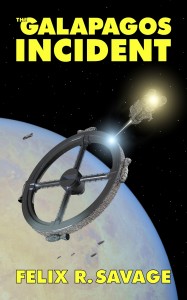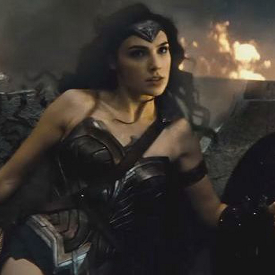 The Galapagos Incident
The Galapagos Incident
Chapter 11
Inasmuch as the PLAN had any discernible war aim—if, indeed, this conflict was a war, rather than a terror campaign, as the doves on the Security Council insisted—it was the extermination of purebloods. The PLAN slaughtered them by preference, favoring targets where pureblood populations were known to reside. This went a long way towards explaining why it was now virtually taboo to ask anyone about their heritage. We become what our enemies want us to be. Though it would have been infamous for the UN and its allies to promote intermarriage explicitly in order to do the PLAN’s job for them, it was hardly necessary: that was the direction society was moving in, anyway. “Purebloods,” even by the most generous definition, now comprised no more than 25% of the non-Chinese population.
And now there was one less.
Elfrida stood, EVA-suited and tethered to the nearest stanchion, in the cargo bay of the Kharbage Can, 1100 kilometers above Venus. She opened her glove. She held a vial which contained the mortal remains of Jim Hardy. Those mortal remains which hadn’t gone into the recycling system, anyway. The tiny size of the vial seemed to give credence to the theory that corpses in space were processed with the sewage—a deathless rumor that had gained new life, in the aftermath of forty-seven fatalities among Botticelli Station’s crew.
Forty-seven. A staggering toll. But Hardy was the only one she’d known personally.
“Goodbye, Hardy,” she whispered, and shyly corrected herself: “Jim. I wish … I wish …”
She wrestled with the screw-top of the vial. Hardy’s ashes puffed into the void. Sooner or later, gravity would gather them back in towards the planet he’d loved.
It was painful to think how close he—and she—had come to seeing Venus face to face.
In the end, Botticelli Station had not crash-landed. The hydrogen hack had increased the station’s buoyancy enough to keep it drifting through the clouds at an altitude of 60 kilometers, with the surviving personnel all packed into Operations. The trade-off was that using the hydrogen as the equivalent of water-wings for the space station meant not using it to power the life support systems. Captain Sikorsky had ordered everything turned off, even the air. They had donned EVA suits and squatted in the dark, like Neanderthals before the discovery of fire, each one alone with his or her thoughts. Elfrida would not soon forget those hours.
She remembered, too, that when their ordeal ended, she’d felt mixed emotions. Relief, of course, but also a pang of disappointment. Venus had got away from her.
The end had come in the form of a drone from the Kharbage Can. The recycling barge, newly returned from its trip to 11073 Galapagos, had blundered right into the one-sided battle between Botticelli Station and the PLAN ninepack. The Kharbage Can had been the larger ship Elfrida spotted on the autofeed. She could well imagine that Captain Okoli had jumped in with both feet, eager for some live firing practice. According to him, the Can had accounted for two PLAN ships, and the rest of the ninepack had fled, as they typically did when opposed by superior artillery.
After seeing the enemy off, the Kharbage Can had remained in orbit, tracking Botticelli Station’s plunge into the atmosphere of Venus. Although the crippled station could not receive transmissions, Okoli had read its Mayday signals and understood that it was taking evasive action, not crashing. He wasted several hours trying to browbeat his astrogator into coming up with a course that would allow the Kharbage Can to burn into the atmosphere and scoop the station up in its grapples without killing everyone inside. This turned out to be impossible, as his astrogator had told him to begin with. Acquiescing to reality, Okoli had settled for sending down a drone, followed by two of the Superlifter tugs that travelled with the barge. These indestructible little machines were equipped with rotors that enabled them to fly in gravity, like helicopters. They ferried the survivors safely up to the Can.
It was rumored that Captain Sikorsky, the last to leave Botticelli Station, had kissed the tortured metal and promised, “Someday vee vill be reunited … on Venus!”
Forty-eight hours later, it looked as if the station might be saved after all. The techies had gone back down in the Superlifters to work on the engines. Their battle against gravity, mass, and time continued at nerve-fraying speed, but Elfrida’s part in it was at an end. She had nothing to do on the Kharbage Can except take her meds and brood. That was another reason she’d volunteered to conduct Hardy’s funeral.
It was a symbol of their spiritual impoverishment as much as anything, Elfrida privately reflected, sticking the empty vial into her suit’s thigh pocket. What did it mean to scatter a few molecules of bonemeal into the vacuum? Would it really make Hardy’s family feel better to know that someone had stood in a cargo bay and said a few inadequate words?
“You weren’t an asshole, Hardy.” she whispered. “I’m sorry I misjudged you. And I’m sorry about what I said back there, you know, in the corridor. I wish I’d been brave enough to apologize. I just never thought … never thought you wouldn’t be around afterwards.”
After surviving his suicide attempt, Hardy had died in Operations while they waited for the Superlifters to arrive. Elfrida could not bear to imagine what he may have endured, alone in his EVA suit, as he realized that ‘the stuff’ was working after all.
“Trust the fucking UN to fuck up the simplest things,” she muttered in anger, turning away from the view.
“Actually, that’s a great epitaph,” said a voice in her helmet. “We could use it for all these funerals.”
Elfrida jumped. “Dos Santos!”
The manager stood at the back of the cargo bay, in the shadow of the overhanging roof. It was funny, Elfrida thought, the way you could recognize someone even in the sexless Lego-man silhouette of a standard-issue UN spacesuit. If you knew them really well.
Did she know dos Santos really well?
Did she know her at all?
The truth was that Elfrida had been avoiding dos Santos. Not only was she embarrassed about her inappropriate nympho confession, she was uncomfortably aware that she’d seen dos Santos break several regulations and probably a law or three, as well. The older woman had to be concerned about that. Elfrida had been trying for two days to think of a tactful way to let her know she wasn’t going to say anything.
“I didn’t realize my comms were on,” she said lamely.
“Oh yeah. You transmitted the whole funeral over the public channel. People were cracking up in the mess. Smile.”
Elfrida cursed and fumbled with the controls on her wrist panel. She was used to manipulating suit functions with a blink or two and a whispered command. On Botticelli Station, everything had been connected to everything. But on the Kharbage Can, nothing was connected to anything. It was a very private-sector way of doing things, betokening a low level of trust among shipmates. Captain Okoli certainly did not trust the refugees from Botticelli Station. He had politely declined to let them access his hub at all. Elfrida was isolated in her suit like some 21st-century astronaut. She pawed at what looked like the right dial and switched to an unoccupied frequency. “Hello, hello?”
Dos Santos picked up the conversation without skipping a beat. “You missed your thirteen-hundred medical appointment.”
“I wanted to do this.”
“You need to take this treatment seriously, Goto. We each absorbed a dose of maybe a hundred rem. You feel better now, but that’s because we’re into the latent period. In a few days, you’ll start vomiting again. You’ll experience diarrhea, bleeding, cardiovascular collapse, and maybe death … if you don’t take those stem-cell transfusions.”
“OK, OK. You’ve scared me,” Elfrida said. “Smile.”
“Have I, Goto? Have I scared you?”
Dos Santos walked out of the crisp shadow of the roof and into Venus-light. She was not wearing a tether. Elfrida automatically felt for her own tether and tugged it to make sure it was properly secured to the stanchion. These tethers were safety-tested up to 2 tonnes. You had to enter a Morse-like sequence of button pushes to release them.
“If you’re not scared,” dos Santos said, “maybe you should be. Give it some thought.”
“Ma’am, I don’t understand.”
Far below, specks of light winked on the nightside of Venus’s terminator. Botticelli Station had drifted around to the dark side of the planet, and the Superlifters had followed it. The Kharbage Can was trailing after them, maintaining line-of-sight comms with the engineers laboring on the stricken station. Soon the barge, too, would cross into Venus’s shadow. The cryosphere smouldered against the blackness of space, Venus’s molten ground illuminating the clouds.
“Think they’ll manage to save the station?” dos Santos said. It seemed like a step back into small talk.
“I hope so,” Elfrida said. “I mean, it would be awful if they couldn’t. It would set the Project back years. And the cost!”
“You really are the perfect little space cadet, aren’t you? Unfailingly brave, loyal, and cost-conscious.”
No one had ever called Elfrida brave or loyal before. Nor did the words feel much like praise now. In fact, they sounded sarcastic. Unhappily, she fiddled with her tether.
Dos Santos walked past her to the very edge of the mooring plate. Terror blossoming, Elfrida lunged for her, then bobbed back upright on the dry-grip treads of her suit, feeling foolish.
“Weren’t going to push me over, were you?” dos Santos said. “Laugh.”
“Ma’am, you ought to be wearing a tether! That’s not safe.”
“This ship isn’t safe,” was dos Santos’s quelling response.
That was certainly true. The Can was a twin-module Startractor, serially refurbished but showing its age. Not that it had been a very luxurious ride in the first place. Cargo Bay No. 1, like Nos. 2 and 3, was simply an open space between circular mooring plates threaded on the keel like slices of carrot on a skewer, behind the forward radar dome. Elfrida and dos Santos shared it with assorted shipping containers. Below their feet was the auxiliary craft dock, but it was empty, since both of the Superlifters were far away on Venus’s nightside. If either dos Santos or Elfrida fell overboard, their chances of rescue would be poor.
“In a way, it would be better if the station couldn’t be saved,” dos Santos said, as if to herself. But she was not the type to accidentally leave her transmitter on. She must have meant Elfrida to hear that.
“Ma’am, because …?”
“In strict confidence, you’d be surprised to know how many people—highly placed people—think the Venus Project is a colossal boondoggle. If you were a fly on the wall in certain important places when the news broke, you would have heard the sound of champagne corks popping. Ironic, isn’t it? But it wouldn’t be the first time our enemies have done for us what we should have done for ourselves.”
“I know the Project’s got enemies,” Elfrida said in confusion. “But we can’t let them win!”
“The question is, what do we mean by victory? Sometimes we’re our own worst enemies,” dos Santos said, her voice soft, almost sad.
“Speaking of being your own worst enemy,” Elfrida said grimly. She punched in the code to release her tether. It came loose from the stanchion and retracted to her belt. She edged forward to stand beside dos Santos. Their toes were over the lip of the mooring plate. Two-foot fluorescent yellow script around the edge of the plate read: SECURE ALL CARGO BEHIND THIS LINE.
Dos Santos’s faceplate swivelled. “Goto, get back behind that yellow line.”
“Ma’am, you’re not my mother.”
“Ha! Feisty.”
“I haven’t had a chance to tell you … Back on the station, I did something really stupid.”
“Yes?”
“Well, I’d better start from the end. Before he died, Hardy filed a complaint against me.”
“He did what?”
“Yeah. He went to all the trouble of requesting a form, while we were crammed in there without any air. It got queued, and I only found out about it this morning. He accused me of—” it made her stomach hurt even to say the word— “racism.”
“Are you kidding?” This was the old dos Santos, righteously riled up. “What on earth did you say to him?”
“I said—oh dog, I know I shouldn’t have. But I said that maybe the PLAN attacked us because he was on board.”
“Oh, Goto. That’s just silly. They wouldn’t send a ninepack after one pureblood.”
“I know. But they aren’t even supposed to be active in this volume. There has to be some reason …”
Up went the monitory finger, a plump pale blue sausage. “Goto, think. What asteroid in this volume did we recently find out about? With what kind of an unusual population? My guess, if you want it: that’s where the ninepack is going. We just happened to be on their way.”
Elfrida reeled. “I haven’t breached security. I’ve been using quantum encryption protocols.”
“Yeah, but where did our information about 11073 Galapagos come from in the first place?”
To read the other chapters of THE GALAPAGOS INCIDENT, click here.










